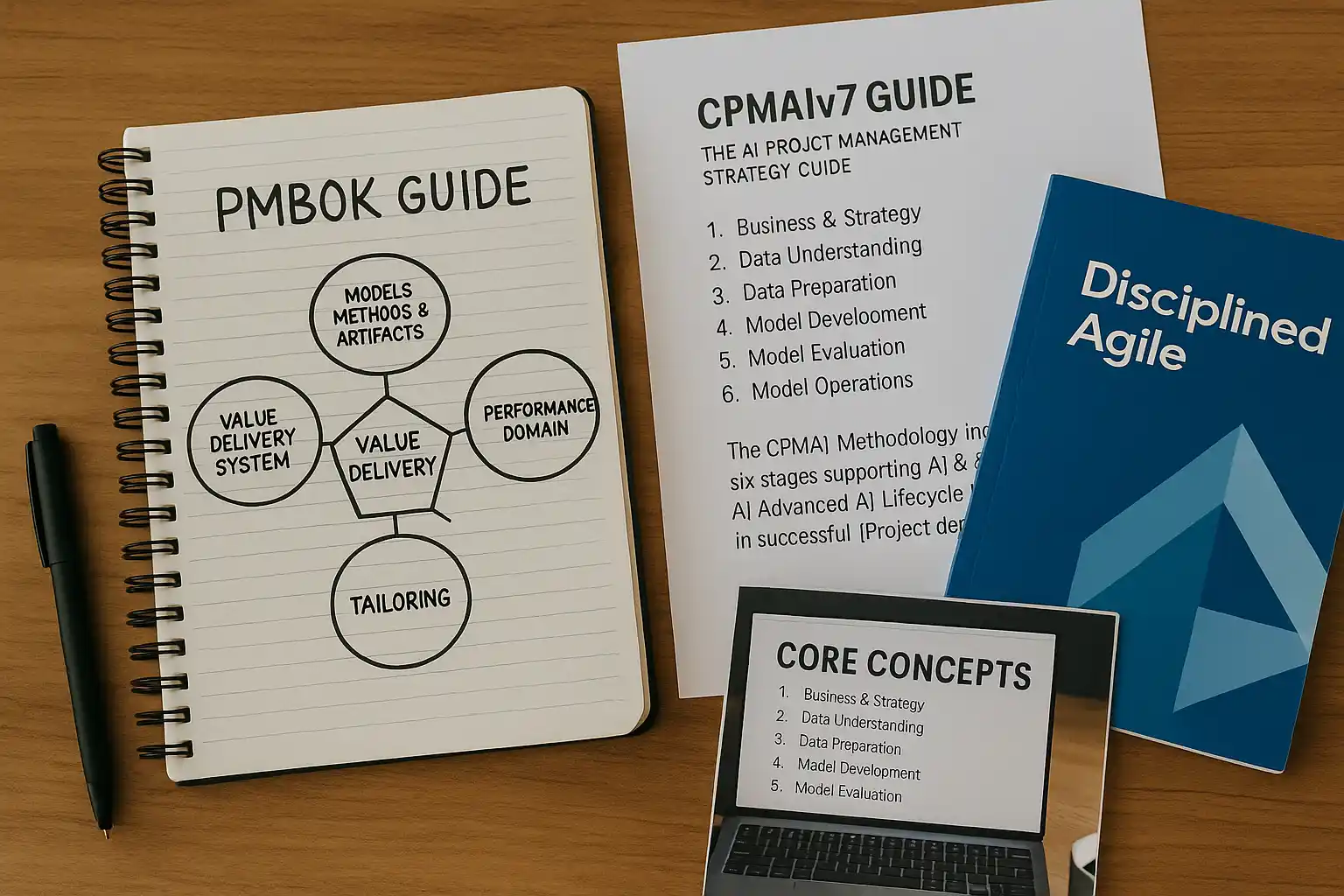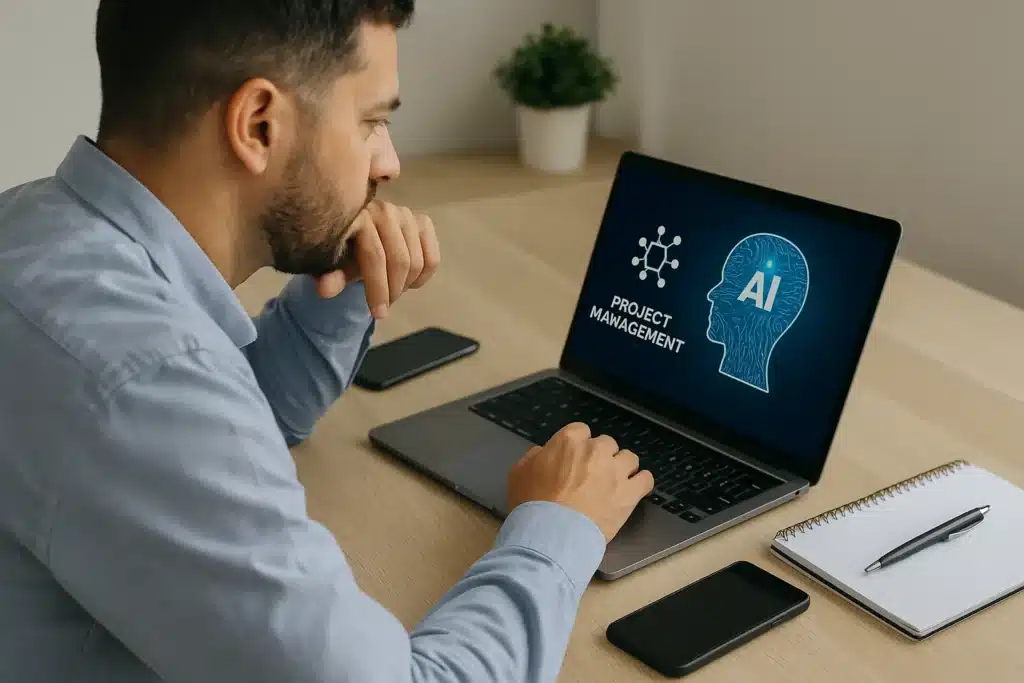AI in Project Management : Opportunities and Limitations
Author: Hajime Estanislao, PMP®; Editor: Geram Lompon; Reviewed by: Alvin Villanueva, PMP®, PMI-ACP®
Projects rarely progress in a straight line. Deadlines shift, risks emerge, and priorities change rapidly. Traditional
When combined with the PMBOK 7th Edition, CPMAI v7, and Disciplined Agile, AI-powered methods enhance
What Do We Mean by AI-Powered Project Management ?
AI-powered
- Generative AI tools summarize stakeholder feedback, draft project plans, and automate documentation.
- Machine learning identifies project data trends, predicts schedule delays, and highlights resource allocation challenges.
- Automated task management systems handle reminders, reporting, and progress updates.
Example:
A software development team delivering multiple projects utilizes an AI-powered dashboard to track key performance indicators such as cycle time and bug resolution rate. Another example is a virtual assistant that updates stakeholders on the timeline.
AI functions as an assistant, reducing complexity, allowing project managers to focus on strategic thinking, project requirements, and leadership.

Core Concepts: PMBOK 7, CPMAI v7, and Disciplined Agile
- PMBOK 7th Edition emphasizes adaptability and value delivery, aligning with the strength of artificial intelligence in adjusting to new project conditions.
- CPMAI v7 guides AI initiatives through stages: Business Understanding, Data Preparation, Model Development, Evaluation, and Operationalization. It ensures the responsible use of historical project data.
- Disciplined Agile (DA) complements AI by offering flexible choices. AI insights identify bottlenecks or predict project delays, enabling teams to tailor their ways of working (WoW).
Pros of AI in Project Management
- Efficiency in routine tasks
- AI automates repetitive tasks such as status reports, meeting notes, and scheduling.
- Example: Automating weekly progress reports allows project managers to focus on engaging with stakeholders.
- Improved risk management
- AI algorithms forecast potential risks from historical data and real-time metrics.
- Example: A construction project uses predictive analytics to weather and supply-chain data, adjusting schedules before delays occur.
- Optimized resource management
- AI matches team members’ skills to project needs, improving resource availability.
- Example: AI tools allocate developers across multiple projects, balancing workloads to avoid burnout.
- Data-driven decision making
- Analyzing relevant data improves accuracy in project plans and strategic thinking.
- Example: An AI solution identifies cost overruns early, allowing reallocation of budgets and resources.
- Better communication and collaboration
- Natural language processing (NLP) supports team collaboration, instant translations, and automated feedback summaries.
- Example: A global product team uses AI-powered tools to summarize user feedback across languages, refining product features.

Cons of AI in Project Management
- Dependence on data quality
- Inaccurate or incomplete project data leads to flawed insights.
- Example: If historical records of risks are incomplete, the AI may underestimate threats.
- Over-reliance on automation
- Automating too many project tasks risks weakening human oversight.
- Example: A project team defers to AI’s scheduling, ignoring context such as stakeholder availability.
- Ethical and privacy concerns
- AI handling sensitive project data must avoid bias or breaches.
- Example: Algorithms recommending promotions based on flawed performance data may reflect bias.
- Adoption resistance
- Team members may resist embracing AI, fearing reduced roles or redundancy. Experienced managers worry that AI will overshadow their judgment in
project management efforts.
- Team members may resist embracing AI, fearing reduced roles or redundancy. Experienced managers worry that AI will overshadow their judgment in
- Limited adaptability
- AI tools may clash with Disciplined Agile’s flexibility.
- Example: AI-generated rigid plans could conflict with agile sprint planning.
Predictive Analytics: Anticipating Outcomes
Predictive analytics shifts
- Project success rates improve through aligned commitments to available resources.
- KPIs such as cost variance and schedule adherence become easier to monitor.
Enhanced Communication: AI as a Collaboration Catalyst
AI in project communication supports transparency and inclusivity:
- Virtual assistants deliver instant updates.
- AI-powered dashboards centralize progress for critical stakeholders.
- NLP automates translation, ensuring global teams share the same information.
Step-by-Step: Smarter Project Management with AI
- Align with adaptive roadmaps – Use scenario testing to refine project lifecycle tradeoffs.
- Build intelligent portfolios – Prioritize projects with data-driven insights on ROI.
- Run AI-informed planning sessions – Forecast workloads and optimize resource allocation.
- Maintain visibility – Use dashboards for continuous progress tracking.
- Reflect with AI insights – Automate retrospectives, learn from historical data, and enhance future outcomes.
Best Practices for Integrating AI
- Select AI tools that fit the company’s culture.
- Maintain secure and high-quality
project management data. - Train project teams in both AI systems and ethical practices.
- Monitor AI recommendations and adapt with strategic thinking.
- Combine automation with human leadership to enhance project success.

Considerations: Human Judgment Still Matters
AI provides precision and efficiency, but project managers provide context and empathy. AI may surface patterns, yet leaders must decide whether recommendations align with project requirements and stakeholder values.
The Future of Project Management
In the near future, expect:
- Advanced machine learning models predicting project performance.
- Generative AI tools are creating living project plans and simulations.
- Wider adoption of AI-powered dashboards across industries.
- The balance of AI solutions with human oversight will define successful project outcomes.
References
Cognilytica. (2024). Cognitive Project Management for AI (CPMAI) methodology version 7 . Cognilytica. https://www.cognilytica.com/cpmai
Harvard Business Review. (2023, February 21). How AI will transform
Project Management Institute. (2021). A guide to the project management body of knowledge (PMBOK® guide) and the standard for
Project Management Institute. (2025). PMI Infinity.
Project Management Institute. (2025). Pulse of the Profession 2025.

